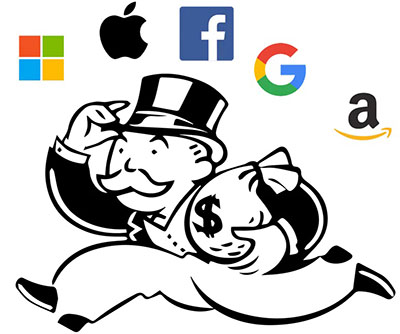Special to WorldTribune.com, May 17, 2021

Corporate WATCH
Commentary by Joe Schaeffer
There are five major companies that make up the Big Tech label. ALL have intimate ties with Big Pharma. Isn’t that something?
I. Microsoft has GlaxoSmithKline CEO Emma Walmsley on its Board of Directors.
The British-based multinational is one of the largest pharmaceutical companies in the world. As a quick follow-up to last week’s column on the resurgence of utilizing aborted babies for medical research, here is GSK’s stance on the issue. A “GSK Public Policy Positions” found on the corporate website states it for the record: We use fetal tissue harvested from abortions:
 Fetal stem cells and other fetal material used by GSK and our external collaborators are obtained from hospitals and/or clinics with the consent of the woman. Unlike HESCs, which can be obtained from stem cell banks, the use of fetal material usually requires access to newly consented tissue. This process is completely separate from a woman’s decision whether to terminate her pregnancy and is initiated only after the woman’s decision to terminate has been made.
Fetal stem cells and other fetal material used by GSK and our external collaborators are obtained from hospitals and/or clinics with the consent of the woman. Unlike HESCs, which can be obtained from stem cell banks, the use of fetal material usually requires access to newly consented tissue. This process is completely separate from a woman’s decision whether to terminate her pregnancy and is initiated only after the woman’s decision to terminate has been made.
Any current, or future, use of HESCs or fetal material by GSK or by outside collaborators follows established ethical requirements and rigorous scrutiny. It includes confirmation that the provider of the material has obtained informed consent from the donor.
II. Alphabet, owners of Google and YouTube, has Dr. Frances Arnold on its Board.
Arnold is a biochemist who works to develop products for Big Pharma.
From a New York Times feature article on her in 2019:
In April, Dr. Arnold and three of her former postdocs filed the papers for a start-up called Aralez Bio, which will apply the principles of directed evolution to produce customized amino acids for drug companies.
As currently configured, the pharmaceutical industry is astonishingly “not green,” said Christina Boville, the chief scientific officer of the new venture.
“They produce 100 times more waste than product,” she said. “We think we can do much better, and our technology actually works.”
Arnold is a stout defender of GMO foods, which should be extremely frightening when you consider that she is using the same idea for human beings:
“We’ve been modifying the biological world at the level of DNA for thousands of years,” Arnold said at a news conference, citing examples such as new dog breeds. “Somehow there is this new fear of what we already have been doing and that fear has limited our ability to provide real solutions.”
Arnold argued that genetically modified crops could make food production more environmentally sustainable and help feed the world’s growing population. Genetic modifications can make crops drought and disease resistant.
Arnold is also on the Board of Directors for Illumina, a biotechnology company focusing on gene experimentation as medical treatment.
Former FDA Commissioner Scott Gottlieb is also on the Board of Illumina.
He is also on the Board of Pfizer.
Illumina President and CEO Francis deSouza is on the Board of Directors at Disney. My, what a sordid web it all is.
Illumina created a cancer blood test startup known as GRAIL with funding from Microsoft co-founder Bill Gates and Amazon founder Jeff Bezos:
What if a simple blood test could detect any cancer early, when it was still easy to treat?
It sounds like science fiction. But Illumina, the $24 billion (market cap) biotechnology company that has pioneered cheap, efficient sequencing of DNA, says it could be a reality in a few years. It is launching a new startup, GRAIL (because such a test would be a holy grail for cancer doctors), with $100 million in funding. Illumina will hold a majority share. Other backers include Sutter Hill Ventures, ARCH Ventures, Jeff Bezos’ Bezos Expeditions and Bill Gates. The startup could have vast medical, economic and societal implications–if the technology really works.
GRAIL was spun off from Illumina but the company re-purchased it in 2020.
III. Amazon has a rather fascinating Big Pharma connection in Wendell P. Weeks, CEO of glass maker Corning Inc., who sits on its Board. Weeks had served as a Board member at Merck from 2004-2020.
Corning has capitalized on Weeks’s Big Pharma ties to boost its business by making the glass vials that contain the vaccines:
In 2011, Corning’s CEO, Wendell Weeks, was on the board of directors for a major pharmaceutical company. In conversations with executives, Weeks started hearing about frustrations with glass vials for vaccines. The vials were made of a kind of glass – borosilicate – that had been around for nearly a century. As Weeks learned, friction on the surface of the borosilicate vials could lead to jams on fast-moving vaccine assembly lines. The conventional vials could too easily crack or break or slough off tiny glass particles that could contaminate the liquid inside.
As Weeks dug deeper, he started to think this was a problem Corning could solve – and that solving it could create a multibillion-dollar opportunity, considering the value of vial sales combined with the value of prevented glass-quality issues. Corning enlisted Merck and Pfizer as a development partners, and the innovation journey began.
The coronavirus vaccine has been a huge moneymaker for Corning, as this March 26 press release shows:
“Company to receive an additional $57 million in funding to address growing demand for domestic glass tubing and vial manufacturing capacity as part of the U.S. COVID response to accelerate vaccination”
[…]
Corning has accelerated its advanced glass vial production capacity to support pharmaceutical manufacturers that are delivering hundreds of millions of doses of potentially life-saving vaccines to Americans. This expansion effort, to support President Joe Biden’s goal of vaccinating the majority of Americans against COVID-19 in the next few months, will increase production of Corning’s pharmaceutical glass tubing and vials, including Corning Valor® Glass vials.
[…]
This award is in addition to the $204 million contract announced in June 2020, for a total of $261 million invested in Corning’s pharmaceutical vial and tubing manufacturing capacity.
IV. Apple has Arthur. D. Levinson as its Chairman of the Board. He is the former CEO of Genentech, a biotech company that is now a subsidiary of Big Pharma powerhouse Roche.
Levinson is the creative force behind Calico, Big Tech’s attempt to live forever:
With just two short sentences posted on his personal blog in September 2013, Google co-founder Larry Page unveiled Calico, a “health and wellbeing company” focused on tackling aging. Almost a year earlier he had persuaded Arthur Levinson, the driving force behind the biotech giant Genentech and chairman of Apple, to oversee the new business and lined up $1.5bn in funding pledges — half from Google, the balance from AbbVie, the pharmaceutical company [originally spun off from Abbott Laboratories].
[…]
It was a classic Silicon Valley cocktail: a bold mix of money, medicine, technology and hubris. [Journalist Chip] Walter describes how entrepreneurial scientists, experienced investors and IT pioneers united and divided as they strived to turn aging into a disease that could be cured.
Calico’s mission statement declares:
Our mission is to harness advanced technologies to increase our understanding of the biology that controls lifespan. We will use that knowledge to devise interventions that slow aging and counteract age-related diseases and enable people to lead longer and healthier lives. Executing on this mission will require an unprecedented level of interdisciplinary effort and a long-term focus for which funding is already in place.
Pharmaceuticals are a big part of the effort:
Our clinical development efforts are buoyed by collaboration, both within Calico and with our external partners. For example, we work closely with the Broad Institute of MIT and Harvard on drug discovery programs, most notably a target screening program that yielded a number of promising immunotherapy cancer targets we are actively pursuing.
Another collaboration with AbbVie provides us with the scale and scope necessary to bring a new medicine to patients while maintaining our focus on target discovery and early-stage clinical development. Calico is responsible for preclinical and clinical development through human proof of concept studies, with AbbVie responsible for late stage clinical development and commercialization. Our teams partner hand-in-hand with our colleagues at AbbVie in a collaboration structure that augments the strengths of both partners.
V. Facebook Founder Mark Zuckerberg’s Chan Zuckerberg Initiative in 2016 hired its “Head of Science” away from Big Pharma goliath AstraZeneca:
The $3 billion health initiative set up by Facebook co-founder Mark Zuckerberg and his wife Priscilla Chan has hired one of AstraZeneca’s non-executive directors to head up its science drive.
The British drugmaker said on Wednesday that Cornelia Bargmann would step down from its board next month to take up a new role as president of Chan Zuckerberg Science, part of the Chan Zuckerberg Initiative.
A 2016 CNN article highlights the bold scope of Zuckerberg’s health vision, one based on developing a tight network:
Bargmann’s new job will be, in Chan’s words, “to build out the strategy and partner with academia, biotech and engineering” to help realize the vision of the initiative. In practical terms, she will oversee a multibillion-dollar effort and work closely with the Chan Zuckerberg Initiative’s science advisory board to support and help bring research to fruition.
Summary: Big Tech wants to turn health care into an all-encompassing octopus similar to what it has become in people’s lives.
It’s about constructing a gigantic Health System that operates with the immediacy and overarching dominance of Big Tech. All of humanity will fall into this system. This is why you’ve been walking around with a mask on your face for over a year. They want you to get used to being part of one vast worldwide system.
Joe Schaeffer is the former Managing Editor of The Washington Times National Weekly Edition. His columns appear at WorldTribune.com and FreePressInternational.org.
INFORMATION WORLD WAR: How We Win . . . . Executive Intelligence Brief
